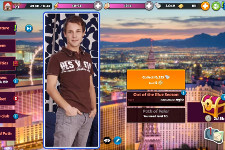
Gay games
In the wider gaming landscape, LGBTQ+ representation can sometimes be hard to find. But gay games like erotic sex simulator The Tearoom and Hurt Me Plenty have helped to bring them into the spotlight. The Gay Games are an empowering event that celebrates diversity, love and equality. First held in 1982, the Games are open to athletes of all sexual orientations. Tom Waddell, a decathlete who competed in the 1968 Mexico City Olympics, dreamed of a sports event for athletes of all sexual orientations. Inspired by the Olympics, he envisioned an event that was welcoming and inclusive.
The first Gay Games took place in 1982. At the time, homophobia was rampant, but athletes fought through it and grew stronger. Their efforts have had a lasting impact. The first games, now called the Gay Games after the IOC sued for their name, were launched in 1982. Waddell, a decathlete who placed sixth in the Olympic Games in Mexico City in 1968, wanted to create an event that would humanize LGBTQ people to spectators.
He modeled the events after the Olympics and included both men and women. The Gay Games were a success, and have grown to include over thirty sports and many more cultural participants. The Games have since become an international phenomenon. It's where a same-sex figure skater and partner can wear denim jumpsuits, and where a trans basketball player from Uganda can compete. Organizers hope Hong Kong can foster similar change in a region where the sexual minorities' rights are lagging behind. It's the first time in the Gay Games' 40-year history that they have been held outside of the US.
The best gay game to play
The Gay Games are a place where LGBTQ athletes compete. But it's also a space for activism, especially in countries where discrimination persists. Waddell created the Gay Games at the height of the HIV/AIDS crisis and envisioned them as vessels for change. Even after marriage equality, his vision remains true. The Games gay are a counter to homophobia and intolerance. And they bring joy to thousands.
The Gay Games have forged ahead after being delayed by the COVID pandemic. The upcoming event in Hong Kong, which has chosen Guadalajara as its co-host, will be the first time the international sporting competition has visited Asia. Unlike the Olympics, where athletes compete on a nation-basis, participants represent their cities. They promote fair play, inclusion and doing your best. The same values that Tom Waddell advocated for in his lifetime.
![]() Stud Game
Stud Game![]() 3D Gay Game
3D Gay Game![]() Men Bang
Men Bang![]() LGBT gay games
LGBT gay games![]() Cockville
Cockville![]() Fap CEO: Men Stream
Fap CEO: Men Stream![]() Gay Harem
Gay Harem![]() FutaDomWorld
FutaDomWorld![]() 3D GayVilla 2
3D GayVilla 2![]() Gay Pornstar Harem
Gay Pornstar Harem![]() Trans Porn Harem
Trans Porn Harem![]() ChatHouse 3D
ChatHouse 3D
GayGames
Like the Olympics of old, the gay games encourage personal achievement and celebrate a sense of belonging. But unlike the Olympic ethos of elitism and nationalism, they also promote acceptance of people who are different. This inclusive ethos is now part of the Games' legacy and will likely endure well after marriage equality and other markers of progress have been achieved. It's a good thing.
At a time when global headlines focus on which gender division transgender athletes should compete in, the Gay Games provide an inclusive model for mainstream sports to follow. It's where a same-sex figure skater can don matching denim jumpsuits and a 65-year-old HIV-positive athlete can run a marathon, decades after AIDS nearly killed him. The games preach acceptance candidly. They are about life and love.
Play gay games online
Founded at the height of the AIDS epidemic, the Gaygames became an opportunity to celebrate life and promote acceptance. They also showcased the resilience of LGBTQ people in the face of discrimination. Hong Kong's convener of its top decision-making body the Executive Council, Regina Ip, supported the event. It is fostering hopes of wider LGBTQ inclusion in the Asian financial hub, following recent court wins for same-sex couples.
Gay games download
The Gaygames visit Asia for the first time in 2022. Paul hopes Hong Kong's government will see the event as a way to support equal rights for gay and lesbian people. Even as homophobia in sports still lingers, the gay games remain an important forum for LGBTQ conversation. Athletes say the event gives them a chance to be themselves for that one week of the year.
In Hong Kong, where same-sex marriage is illegal, the gay game is a way to promote LGBTQ activism. But they have also drawn criticism from groups opposed to equality. Waddell envisioned an event that would humanize gay athletes to spectators. That goal remains a key objective of the games. The next one will be in 2022, when they visit Asia for the first time.




 Stud Game
Stud Game 3D Gay Game
3D Gay Game Men Bang
Men Bang LGBT gay games
LGBT gay games Cockville
Cockville Fap CEO: Men Stream
Fap CEO: Men Stream Gay Harem
Gay Harem FutaDomWorld
FutaDomWorld 3D GayVilla 2
3D GayVilla 2 Gay Pornstar Harem
Gay Pornstar Harem Trans Porn Harem
Trans Porn Harem ChatHouse 3D
ChatHouse 3D 3DXChat
3DXChat AChat
AChat Run Kitty
Run Kitty Cumming Hotel
Cumming Hotel See no Evil
See no Evil Bara Giants
Bara Giants Crave Saga X
Crave Saga X Try not to cum
Try not to cum Gay Game
Gay Game VR Gay Games
VR Gay Games Nutaku Gay
Nutaku Gay Gay Harem
Gay Harem 3D Gays
3D Gays




